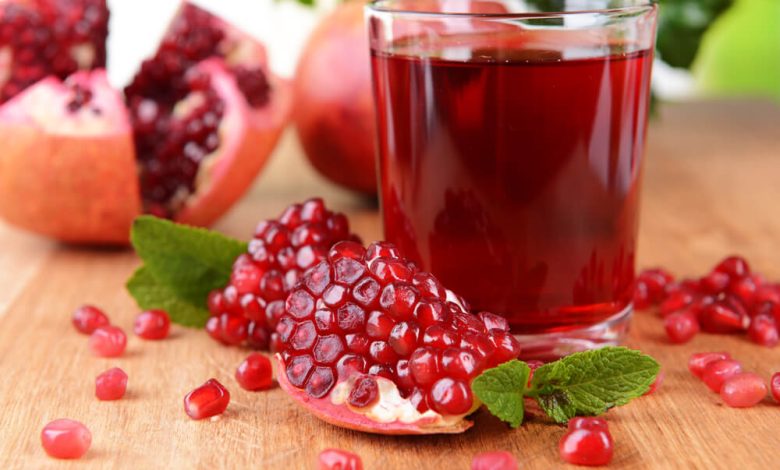Pomegranates: so good for you

Pomegranates are an ancient fruit that has been revered in many cultures for centuries. Known for their ruby-red seeds and sweet-tangy flavour, they are not only delicious but also packed with nutrients and health benefits. Recent studies have shown that pomegranates have powerful antioxidant and anti-inflammatory properties that can help reduce the risk of various chronic diseases. From cardiovascular health to cancer prevention, pomegranates have been found to have a significant impact on overall health and wellness. In this article, we will explore the various health benefits of pomegranates in detail, and how you can incorporate them into your diet to reap their full potential. Get ready to discover the power of pomegranates and why they should become a staple in your healthy lifestyle.
Introduction to the pomegranate fruit
Pomegranates, with their vibrant ruby-red arils and refreshing sweet-tart flavour, have been revered throughout history for their remarkable health benefits. This ancient fruit, known botanically as Punica granatum, is believed to have originated in the Middle East and has since spread its influence across the globe.
The pomegranate is not merely a delicious fruit; it is a powerhouse of nutrients and antioxidants that can significantly contribute to our overall well-being. Its unique composition makes it a valuable addition to any healthy diet.
One of the standout features of the pomegranate is its abundance of antioxidants. These compounds work tirelessly to neutralize harmful free radicals in the body, protecting our cells from damage and promoting longevity. Pomegranates are particularly rich in polyphenols, such as tannins and anthocyanin, which have been linked to various health benefits.
Additionally, pomegranates are an excellent source of vitamins and minerals. They are packed with vitamin C, an essential nutrient that supports a strong immune system and aids in collagen production for healthy skin. Pomegranates also contain vitamin K, which plays a crucial role in blood clotting and maintaining bone health.
Furthermore, this fruit is a rich source of dietary fiber, which promotes healthy digestion and helps to regulate blood sugar levels. It is also low in calories, making it a guilt-free addition to a balanced diet.
The pomegranate’s unique and captivating appearance is a testament to its remarkable nutritional profile. Each pomegranate is filled with hundreds of juicy arils, each containing a wealth of health benefits. From its antioxidant properties to its essential vitamins and minerals, the pomegranate is truly a super-fruit worth exploring.
In the upcoming sections of this article, we will delve deeper into the specific health benefits of pomegranates, highlighting the scientific research that supports their claims. So, grab a pomegranate, sit back, and prepare to uncover the incredible power that lies within this extraordinary fruit.
The Nutritional profile of pomegranates
Pomegranates are not only delicious and refreshing, but they also pack a powerful nutritional punch. These bright red fruits are loaded with essential vitamins, minerals, and antioxidants that contribute to overall health and well-being.
First and foremost, pomegranates are an excellent source of vitamin C, providing a substantial amount of this immune-boosting nutrient. Vitamin C helps protect against common illnesses, aids in collagen production for healthy skin, and supports the absorption of iron in the body.
Moreover, pomegranates contain a unique antioxidant called punicalagins. These compounds have been shown to have potent anti-inflammatory effects and may help reduce the risk of chronic diseases such as heart disease and cancer. In fact, the antioxidant activity of pomegranates is believed to be three times higher than that of green tea and red wine.
Not only do pomegranates offer antioxidants, but they are also rich in dietary Fiber. Fiber is essential for maintaining a healthy digestive system, promoting regular bowel movements, and preventing constipation. It also helps to control blood sugar levels, lower cholesterol levels, and maintain a healthy weight.
Additionally, pomegranates contain other beneficial compounds such as polyphenols, which have been associated with reducing inflammation, improving memory and cognitive function, and protecting against age-related diseases.
In terms of minerals, pomegranates are a good source of potassium, which plays a vital role in maintaining a healthy balance of fluids in the body and regulating blood pressure.
Rich in antioxidants: How pomegranates combat free radicals
Pomegranates, often referred to as the “super-fruit,” are not only delicious but also pack a powerful punch when it comes to health benefits. One of the key reasons behind their reputation as a health powerhouse is their high antioxidant content.
Antioxidants play a crucial role in combating free radicals – unstable molecules that can cause damage to our cells and contribute to various health issues. Pomegranates are loaded with a variety of antioxidants, including polyphenols, flavonoids, and anthocyanin.
Polyphenols, in particular, are abundant in pomegranates and have been extensively studied for their health-promoting properties. These compounds help neutralize free radicals, thereby reducing oxidative stress and inflammation in the body.
Research suggests that the antioxidant activity of pomegranates may help protect against chronic diseases such as heart disease, cancer, and diabetes. Additionally, pomegranate antioxidants have been found to support healthy aging and cognitive function.
Furthermore, the unique combination of antioxidants found in pomegranates has been shown to have potent anti-inflammatory effects. This can be particularly beneficial for individuals dealing with conditions like arthritis or inflammatory bowel disease.
Incorporating pomegranates into your diet is a simple yet effective way to harness the power of antioxidants. You can enjoy the fruit on its own, sprinkle the seeds on salads or yogurt, or even indulge in a refreshing pomegranate juice.
Boosting heart health with pomegranates: Lowering cholesterol and blood pressure
One of the significant ways pomegranates contribute to heart health is by lowering cholesterol levels. Studies have shown that the antioxidants found in pomegranates can help reduce the oxidation of LDL (low-density lipoprotein) cholesterol, commonly referred to as “bad” cholesterol. By inhibiting LDL oxidation, pomegranates can prevent the buildup of plaque in the arteries, which is a leading cause of heart disease.
Additionally, pomegranates have been found to assist in regulating blood pressure. High blood pressure, or hypertension, is a significant risk factor for heart disease. The fruit’s natural compounds, such as polyphenols and anthocyanins, have been shown to help lower blood pressure levels. These compounds work by promoting the production of nitric oxide in the body, which helps relax and dilate blood vessels, resulting in improved blood flow and reduced pressure on the heart.
Incorporating pomegranates into your daily routine can be as simple as enjoying a refreshing glass of pomegranate juice or adding the arils, the juicy seeds of the fruit, to salads, yogurt, or smoothies. By doing so, you can take advantage of the heart-boosting benefits of pomegranates and contribute to a healthier cardiovascular system.
It’s important to note that while pomegranates offer potential heart health benefits, they should not replace a balanced diet and a healthy lifestyle. If you have any existing health conditions or concerns, it’s always best to consult with a healthcare professional for personalised advice. So, why not embrace the power of pomegranates and give your heart the love and care it deserves?
The anti-inflammatory properties of pomegranates
The high concentration of antioxidants found in pomegranates, particularly punicalagins and anthocyanins, play a crucial role in reducing inflammation. These powerful compounds help neutralize harmful free radicals in the body, which can trigger inflammation and damage cells. By combating oxidative stress, pomegranates effectively lower the risk of chronic inflammation and related diseases.
Studies have shown that consuming pomegranate juice or incorporating the fruit into your diet can help alleviate symptoms of inflammatory conditions such as arthritis and inflammatory bowel disease. The anti-inflammatory effects of pomegranates extend beyond easing physical discomfort. They also have a positive impact on overall wellness, promoting cardiovascular health, boosting immune function, and supporting brain health.
Pomegranates for brain health and cognitive function
Research has shown that consuming pomegranates or pomegranate juice may have a positive impact on brain health and cognitive function. Packed with antioxidants, pomegranates help protect the brain from oxidative stress and reduce inflammation, which are both key factors in maintaining brain health.
One of the main compounds found in pomegranates is called punicalagin, which has been shown to have neuroprotective effects. Studies have indicated that punicalagin may help improve memory and learning abilities by enhancing neuronal connections in the brain.
Additionally, pomegranates are a rich source of polyphenols, which have been linked to improved cognitive function and a reduced risk of neurodegenerative diseases such as Alzheimer’s and Parkinson’s. These polyphenols have been found to help protect brain cells from damage and promote their survival.
Furthermore, pomegranates contain high levels of flavonoids, which have been shown to increase blood flow to the brain, resulting in improved cognitive performance. By enhancing blood flow, pomegranates may help nourish the brain with essential nutrients and oxygen, thus supporting optimal brain function.
The role of pomegranates in preventing cancer
Pomegranates, often referred to as “super-fruits,” have gained much attention in recent years due to their potential role in preventing cancer. This vibrant fruit is packed with antioxidants, which are known to combat harmful free radicals that can lead to cellular damage and the development of cancer.
Studies have shown that pomegranates contain compounds such as ellagitannins, punicalagins, and anthocyanins, which possess powerful anti-inflammatory properties and may inhibit the growth and spread of cancer cells. In fact, research suggests that consuming pomegranate extract or juice may help reduce the risk of various types of cancer, including breast, prostate, colon, and lung cancer.
Furthermore, pomegranates have been found to promote apoptosis, a process in which damaged or abnormal cells self-destruct, preventing the formation and progression of tumors. They also exhibit anti-angiogenic properties, meaning they can potentially inhibit the growth of new blood vessels that supply nutrients to cancer cells, thereby limiting their ability to thrive and spread.
In addition to these direct effects on cancer cells, pomegranates also offer immune-boosting benefits. They contain essential vitamins and minerals, including vitamin C, vitamin K, potassium, and folate, which support overall immune function and help the body defend against cancerous cells.
Incorporating pomegranates into your diet can be as simple as enjoying the fruit itself, adding its seeds to salads or smoothies, or drinking pomegranate juice. However, it’s important to note that while pomegranates show promise in cancer prevention, they should not be considered a standalone treatment or a replacement for medical advice.
To fully harness the potential health benefits of pomegranates in preventing cancer, it is advisable to maintain a balanced diet rich in a variety of fruits, vegetables, whole grains, lean proteins, and healthy fats, along with regular exercise and a healthy lifestyle. Always consult with a healthcare professional for personalized advice and recommendations tailored to your specific needs and medical history.
Incorporating pomegranates into your diet: Recipes and tips
One of the simplest ways to enjoy pomegranates is by eating the arils on their own. These small seeds bursting with flavour can be sprinkled over salads, added to smoothies, or even enjoyed as a refreshing snack. Their sweet and tart taste adds a delightful burst of flavour to any dish.
If you’re feeling more adventurous, there are plenty of recipes that showcase the versatility of pomegranates. For a refreshing and colourful salad, try combining arugula, goat cheese, toasted walnuts, and pomegranate arils. Drizzle some balsamic vinaigrette over the top, and you have a vibrant and nutritious meal.
Pomegranate juice is another popular way to incorporate this fruit into your diet. You can enjoy it as a standalone beverage or use it as a base for smoothies or cocktails. Pomegranate juice is not only refreshing but also rich in antioxidants that can help protect your cells from damage.
For a unique twist on traditional dishes, consider adding pomegranate molasses to your recipes. This thick and tangy syrup can be used as a glaze for roasted vegetables, a marinade for grilled meats, or a drizzle over desserts. Its deep and complex flavour profile adds a touch of sophistication to any dish.
Incorporating pomegranates into your diet doesn’t have to be complicated. Whether you choose to enjoy the arils, juice, or molasses, this versatile fruit can elevate your meals and provide a range of health benefits. So why not explore the countless recipes and tips available and start reaping the rewards of the power of pomegranates today?
Here are are a couple of delicious recipes you can try today:

Green Salad with Feta and Pomegranates

Spinach and Pomegranate Salad with Tarragon Mustard Dressing
We hope you enjoyed our exploration of the power of pomegranates and their incredible health benefits. From boosting heart health to improving digestion, this delicious fruit truly packs a punch when it comes to promoting overall well-being. Incorporating pomegranates into your diet can be a simple yet effective way to enhance your health. So go ahead, indulge in the sweet, tart flavor and reap the rewards of this superfood. Cheers to a healthier and more vibrant you!




